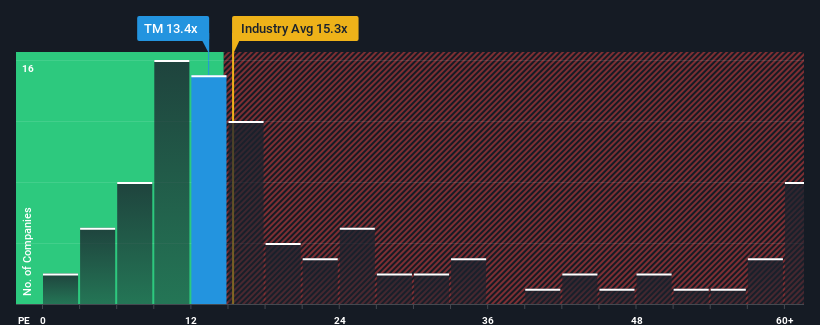There Is A Reason Telekom Malaysia Berhad's (KLSE:TM) Price Is Undemanding

With a price-to-earnings (or "P/E") ratio of 13.4x Telekom Malaysia Berhad (KLSE:TM) may be sending bullish signals at the moment, given that almost half of all companies in Malaysia have P/E ratios greater than 18x and even P/E's higher than 33x are not unusual. However, the P/E might be low for a reason and it requires further investigation to determine if it's justified.
With earnings growth that's superior to most other companies of late, Telekom Malaysia Berhad has been doing relatively well. One possibility is that the P/E is low because investors think this strong earnings performance might be less impressive moving forward. If not, then existing shareholders have reason to be quite optimistic about the future direction of the share price.
View our latest analysis for Telekom Malaysia Berhad

How Is Telekom Malaysia Berhad's Growth Trending?
In order to justify its P/E ratio, Telekom Malaysia Berhad would need to produce sluggish growth that's trailing the market.
Taking a look back first, we see that the company grew earnings per share by an impressive 72% last year. The latest three year period has also seen an excellent 62% overall rise in EPS, aided by its short-term performance. Therefore, it's fair to say the earnings growth recently has been superb for the company.
Looking ahead now, EPS is anticipated to slump, contracting by 2.6% per annum during the coming three years according to the analysts following the company. With the market predicted to deliver 14% growth per year, that's a disappointing outcome.
With this information, we are not surprised that Telekom Malaysia Berhad is trading at a P/E lower than the market. However, shrinking earnings are unlikely to lead to a stable P/E over the longer term. There's potential for the P/E to fall to even lower levels if the company doesn't improve its profitability.
The Final Word
While the price-to-earnings ratio shouldn't be the defining factor in whether you buy a stock or not, it's quite a capable barometer of earnings expectations.
As we suspected, our examination of Telekom Malaysia Berhad's analyst forecasts revealed that its outlook for shrinking earnings is contributing to its low P/E. At this stage investors feel the potential for an improvement in earnings isn't great enough to justify a higher P/E ratio. It's hard to see the share price rising strongly in the near future under these circumstances.
Plus, you should also learn about these 2 warning signs we've spotted with Telekom Malaysia Berhad (including 1 which is concerning).
Of course, you might also be able to find a better stock than Telekom Malaysia Berhad. So you may wish to see this free collection of other companies that have reasonable P/E ratios and have grown earnings strongly.
Valuation is complex, but we're here to simplify it.
Discover if Telekom Malaysia Berhad might be undervalued or overvalued with our detailed analysis, featuring fair value estimates, potential risks, dividends, insider trades, and its financial condition.
Access Free AnalysisHave feedback on this article? Concerned about the content? Get in touch with us directly. Alternatively, email editorial-team (at) simplywallst.com.
This article by Simply Wall St is general in nature. We provide commentary based on historical data and analyst forecasts only using an unbiased methodology and our articles are not intended to be financial advice. It does not constitute a recommendation to buy or sell any stock, and does not take account of your objectives, or your financial situation. We aim to bring you long-term focused analysis driven by fundamental data. Note that our analysis may not factor in the latest price-sensitive company announcements or qualitative material. Simply Wall St has no position in any stocks mentioned.
About KLSE:TM
Telekom Malaysia Berhad
Engages in the establishment, maintenance, and provision of telecommunications and related services in Malaysia and internationally.
Flawless balance sheet with proven track record and pays a dividend.
Similar Companies
Market Insights
Community Narratives




